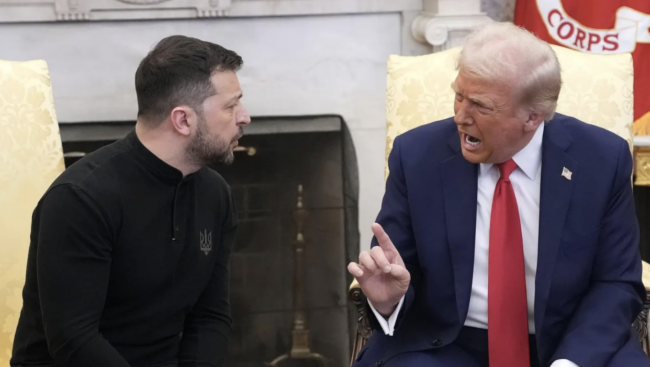During his explosive meeting with Volodymyr Zelensky, the president of Ukraine, an impatient President Donald J. Trump complained, in frustration, that it will “be a very hard thing to do business like this” with respect to the Russia/Ukraine conflict.
In that one comment, Trump revealed his entire approach to diplomacy with Ukraine and the world: He views everything as just a business transaction. After all, Trump is famous for his transactional talents, which he outlines in his book The Art of the Deal. This new approach to diplomacy has been part of Trump’s approach in the past, but now, with this unprecedented meeting, he has revealed it more overtly to the world.
Since his return to the White House (and indeed even before), Trump has claimed ending the war in Ukraine will be a very easy task, one which he believes he can deliver for the world. It may actually be harder to do.
On multiple fronts, Trump has turned American foreign diplomacy on its head. Trump has declared that the Russia/Ukraine war has to come to an end and that he will be the one to get the deal done. Trump has decided that he and Russian President Vladimir Putin, along with Ukraine, will sit together and draw up a plan to end the war. In doing so, he has cut out European leaders in these future talks and has marginalized Ukraine in its role towards peace in the region.
In a recent non-binding UN resolution on declaring Russia the aggressor in the ongoing war, the U.S. shockingly did not vote for the resolution (siding with countries like North Korea and Russia and against almost all of Europe) in keeping with Trump’s leaning towards appeasing Putin.
Trump has also called Zelensky a “dictator” who lacks popular support in Ukraine, both comments that have been proven untrue. According to a recent Ukraine poll, Zelensky is an elected official with an approval rating of 63% in his country.
Despite these attacks, Zelensky has continued to thank the U.S. for its support.
This abrupt change in the U.S. position on Ukraine came to a head this past week when Trump and Zelensky had a discussion in the Oval Office that went off the rails. Trump had invited Zelensky to the White House to sign a minerals deal that would ensure the U.S. was paid back for the 180 billion dollars in military aid they provided to Ukraine to defend against Russia’s onslaught and maintain their sovereignty.
Ukraine fought for assurance that the deal would include a promise for further economic and military support from the US, though this remained vague in the agreement. Most experts agree that the deal seems lopsided, mainly favoring the U.S. in getting their money back from aiding Ukraine.
Some observers have suggested that Zelensky’s strategy included the assumption that the U.S. would want to protect Ukraine against future Russian aggression if Ukrainian land included American business interests, specifically the minerals they are most interested in being mined for America’s profit.
The meeting, which ended in Trump and Vice President JD Vance scolding Zelensky for not being thankful enough for their support, put on view for the whole world Trump’s brand of diplomacy, which centers on business tactics of self-interest and intimidation.
After the disastrous meeting, which Trump called “great television,” Zelensky left the White House without signing the minerals agreement. Trump does not appear to be concerned that this type of diplomacy might weaken U.S. national security by strengthening the worldwide position of leaders like Putin.
It appears that Trump has established clearly that diplomacy with the U.S. is just like making a business deal; there has to be something in it for the U.S. to offer aid or protection. This raises questions of whether the U.S. is participating in a new colonialism—a colonialism in which the superpower uses “diplomacy” to serve its business interests by extracting natural resources from weaker, vulnerable nations.
Trump’s diplomacy as a business is a radical departure from previous U.S. foreign policy. This transition has unknown results and a questionable future.






